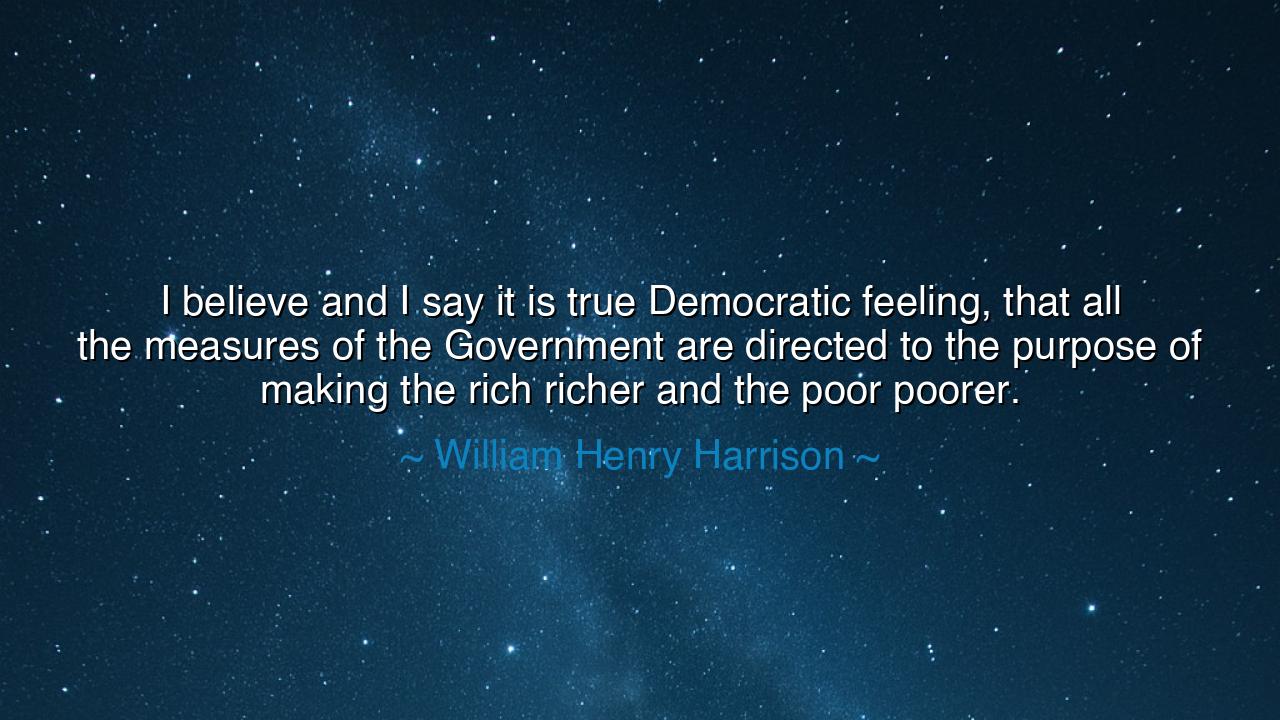
I believe and I say it is true Democratic feeling, that all the
I believe and I say it is true Democratic feeling, that all the measures of the Government are directed to the purpose of making the rich richer and the poor poorer.






In the fervent winds of America’s early republic, when the ink of the Constitution was still fresh upon the conscience of a young nation, William Henry Harrison, soldier and statesman, raised his voice against the gathering storm of inequality. He declared with solemn gravity:
"I believe and I say it is true Democratic feeling, that all the measures of the Government are directed to the purpose of making the rich richer and the poor poorer."
These words, spoken in the fires of the nineteenth century, were not the cynical musings of a disillusioned man, but the lament of one who had seen with his own eyes the creeping corruption of power — the slow tilting of justice toward the strong, and the abandonment of the weak to their hunger. Harrison, though born into privilege, understood that a government born of the people must never become a merchant for the powerful. His cry was a warning: that when wealth becomes the compass of policy, the ship of liberty sails not toward justice, but toward ruin.
The meaning of his words is plain, yet profound. Harrison saw that even in a democracy, the spirit of monarchy can return — not in crowns and scepters, but in money and influence. He spoke of a government that claimed to serve all, yet in practice served the few, passing laws that fattened the pockets of the rich while tightening the chains of the poor. Such governance, he said, betrays the heart of democracy, for true democratic feeling is not found in rhetoric, but in fairness — in the steady hand that lifts the lowly even as it checks the mighty. For when the gap between rich and poor becomes a chasm, freedom itself begins to crumble into dust.
To understand this truth, one must remember the age in which Harrison lived. The Industrial Revolution was reshaping the world — factories rising like temples of progress, their smokestacks darkening the sky. The promise of wealth dazzled the nation, yet its cost was borne by those who toiled in silence. Farmers sank into debt, laborers worked themselves into early graves, and the power of the few magnified as the poverty of the many deepened. Harrison, a man of the frontier, saw how laws and tariffs, crafted by wealthy legislators, favored merchants and banks over the working man. He saw how the instruments of government, meant to balance the scales, were being used to tilt them. Thus his words came as a thunderclap: a reminder that democracy without compassion is tyranny in disguise.
History, ever the mirror of mankind’s folly, reflects this warning again and again. In the days of ancient Rome, when the Senate grew rich on conquest and the people starved in the shadow of luxury, the tribune Tiberius Gracchus rose to speak for the poor. He demanded that the vast estates of the rich be divided, that the land — the lifeblood of the nation — be returned to those who worked it. But the powerful struck him down, fearing the loss of their privilege. Rome rejoiced in her wealth but decayed in her soul, until tyranny rose from her ashes. Harrison’s lament is the same eternal truth: when the law bows to gold, the republic dies not by invasion, but by inequality.
Yet in his sorrow there is also a call — a call to awaken the moral conscience of the people. For Harrison did not despair of government; he believed it could still be redeemed if guided by justice and humility. He believed that true democracy is not the rule of wealth, but the rule of worth — that the measure of a nation’s greatness lies not in the splendor of its palaces, but in the dignity of its poorest homes. His words are not merely an accusation but a challenge: that every generation must ask whether its government serves all, or only a few. For when the strong are favored and the weak forgotten, liberty becomes a mask for greed.
There is a sacred lesson here for those who listen. The government, like the shepherd, must guard every sheep — not only the fattest, but the frailest. Those who lead must remember that power is a loan from the people, not a crown bestowed by fortune. To the citizen, too, there is duty: to remain vigilant, to speak against injustice, to demand accountability. Silence, in the face of inequality, is complicity. The poor do not ask for charity; they ask for fairness. The rich need not be condemned, but they must be restrained from turning privilege into dominion.
So let the words of William Henry Harrison echo across the centuries: “A government is for all, or it is for none.” When laws serve only wealth, the spirit of democracy withers. But when the hearts of rulers remember their brethren — when the hands that hold power also bear compassion — then government becomes what it was meant to be: the guardian of all souls, the protector of all homes, the keeper of balance in the eternal struggle between greed and grace.
Thus ends the teaching: justice cannot live where wealth alone governs, and democracy cannot stand where equality is forgotten. Let every generation remember — the strength of a nation lies not in its riches, but in the righteousness of its rule.






AAdministratorAdministrator
Welcome, honored guests. Please leave a comment, we will respond soon